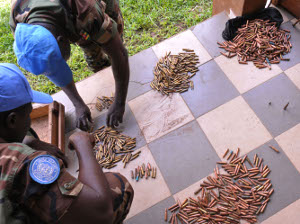Editorial
Constructing peace - the agenda for the present and future

Image: ONUCI
The ancient Greeks placed a great deal of emphasis on managing their social lives and therefore when dealing with conflicts, on finding the right opportunity, the kairós. Encountering the right moment, the kairós, is essential when making peace, resolving conflicts, and transforming social and international relations. When an opportunity arises that is compatible with the coordinated desires of individuals and institutions it is easier to achieve success. The fact of the matter is that at the end of 2011, working to construct peace is both an obligation and an opportunity: there is a kairós. This explains why the central topic of this issue of Peace in Progress is the post-conflict reconstruction process in Côte d'Ivoire. When looking at this case, we would also like to highlight the importance of a generic analysis of the model that emerged in the late 1990s at the United Nations - the so-called liberal peacebuilding consensus. The reasons for this are as follows.
First, November 28th was the first anniversary of the second round of presidential elections in Côte d'Ivoire - elections that led to disputes over the results between the two candidates and between the institutions mandated to certify and proclaim the winner. This created tensions and led to a situation of dual power, many rounds of negotiations with incentives and coercive measures, the proliferation of armed conflicts, and eventually human rights violations and war (in Abidjan and in some areas in the west of the country in particular). The crisis was not resolved until April, with the use of force by the international forces deployed under the terms of a United Nations mandate. Today, half a year into the new government's term of office, it is time for legislative elections and above all, for the agenda of the construction of peace and development to play a central role.
Second, various events in recent months have placed the importance of good planning of the post-war reconstruction processes at the top of the agenda. These are structured in four areas: a) consolidating the end of the violence; b) rebuilding everything that the violent conflict has destroyed - in both material terms and otherwise; c) resolving the reasons for the conflict in a manner that is long-lasting and acceptable to the parties involved; and d) reconciling the opposing parties - a task that entails building a plural narrative of memory, imparting justice, and repairing policies oriented towards managing the past to enable a better future. This will be an important issue in Yemen and Syria, but the most obvious case is Libya, where the construction of peace agenda is enormous and a source of some concern, as there have been some very worrying signs since the end of the fighting, such as the summary execution of Gaddafi. By constrast, the Ivorian government decided to hand over ex-President Gbagbo to the International Criminal Court in The Hague, in a case in which it is worth following developments very closely.
Third, it is important to focus on the construction of peace because 2012 will be 20th anniversary year of the publication of An Agenda for Peace, the report by the UN Secretary-General Boutros Boutros Ghali, which established the idea of peace building and gave birth to the liberal consensus on peace. Twenty years later, with less optimism and none of the euphoria that the end of the Cold War created in terms of the goal of peace and security, it is necessary to take stock of and constructively review almost the entire concept. Indeed, this will be one of the key areas of the ICIP's activities in 2012.
However, complaining is pointless; it is necessary to take advantage of the kairós. An opportunity arises when things do not go as planned, and when the unlikely happens. In the words of the scientist Jorge Wagensberg, if it were not for "the occurrence of improbable events, we would be still bacteria today." Improbable events often happen during the construction of peace, route maps are torn up and it is necessary to resort to DIY.